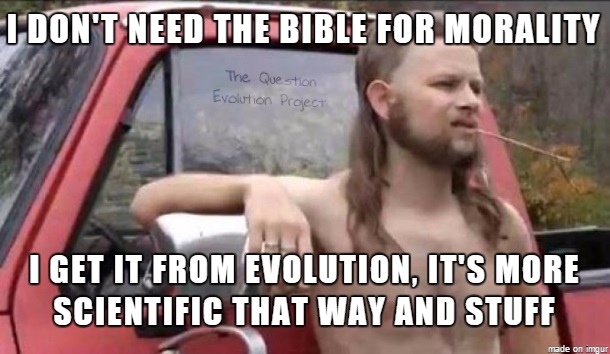God Created Man Created God
A quote attributed to Mark Twain (Samuel Clemens) reads, "In the beginning God made man in His image. And man has been returning the favor ever since." Although Mark Twain was not an atheist (despite claims to the contrary), he had disdain for many aspects of organized religion. What is interesting is that what he said is true to some extent.
People will make up an image of God that they like, expressed in statements like, "My God would...", but seldom have anything to do with the Bible. This is idolatry. Unfortunately, some professing Christians have built up a comfortable, unbiblical, wimpy Jesus that they can worship — which is also idolatry.
Atheists have no consistent standard for morality. Hold your horses, Herman! I'm not saying that atheists have no morality. In fact, many have high standards. But they have no consistent standard. When an unbeliever says, "That's wrong, you're bad for doing...", they're actually appealing to a higher standard (God) and affirming the Bible (Romans 2:15, Romans 1:18-22)! Still, they suppress the truth in unrighteousness, and deny their Creator.
It has been said that religion was created to control people — a statement that cannot be verified. Yes, some religious groups (like the Roman Catholic Church) have used it to keep and consolidate political power, but that abuse does not substantiate the claim that it was made for such a purpose. Some unbelievers appeal to evolution as a basis for their morality, which, when you cognate on it for a spell, is ridiculous. Nature red in tooth and claw, survival of the fittest, time, chance, random processes — no thanks. Still, relying on their presuppositions that evolution is true, some are trying to do that very thing, which makes natural selection a false god and source for morality.
Atheists have no consistent standard for morality. Hold your horses, Herman! I'm not saying that atheists have no morality. In fact, many have high standards. But they have no consistent standard. When an unbeliever says, "That's wrong, you're bad for doing...", they're actually appealing to a higher standard (God) and affirming the Bible (Romans 2:15, Romans 1:18-22)! Still, they suppress the truth in unrighteousness, and deny their Creator.
It has been said that religion was created to control people — a statement that cannot be verified. Yes, some religious groups (like the Roman Catholic Church) have used it to keep and consolidate political power, but that abuse does not substantiate the claim that it was made for such a purpose. Some unbelievers appeal to evolution as a basis for their morality, which, when you cognate on it for a spell, is ridiculous. Nature red in tooth and claw, survival of the fittest, time, chance, random processes — no thanks. Still, relying on their presuppositions that evolution is true, some are trying to do that very thing, which makes natural selection a false god and source for morality.
Another theory is making the rounds that social groups invented moralizing gods to keep people under control.To read the rest of this excellent article, click on "Did Man Create God, or Vice Versa?"
Once upon a time, hunter-gatherers lived in small groups that were able to check on each other. But then a mutation happened, and people started to live in large groups that were too big for everyone to know everyone. As towns grew into cities, tribal chieftans needed ways to keep non-cooperators from getting out of hand, so they invented moralizing gods. And thus, religion became adaptive by natural selection.
This is the theory Ara Norenzayan has been working on for the last few years (see 11/09/09, “Darwinizing of Religion Continues” and 12/06/11, “The Science of Atheism”). A Lebanese-born American sociologist very experienced with his native country’s sectarian warfare fueled by religious fervor, Norenzayan is now working to legitimize his theory with scientific-sounding data to support the thesis of his 2013 book, Big Gods: How Religion Transformed Cooperation and Conflict. With compadre Edward Slingerland, he his seeking out religion experts in the humanities departments to “check boxes” on a new “Database of Religious History.”
